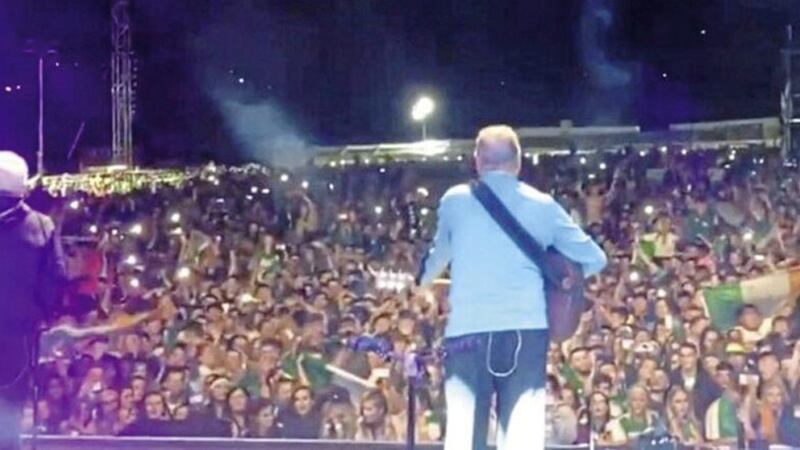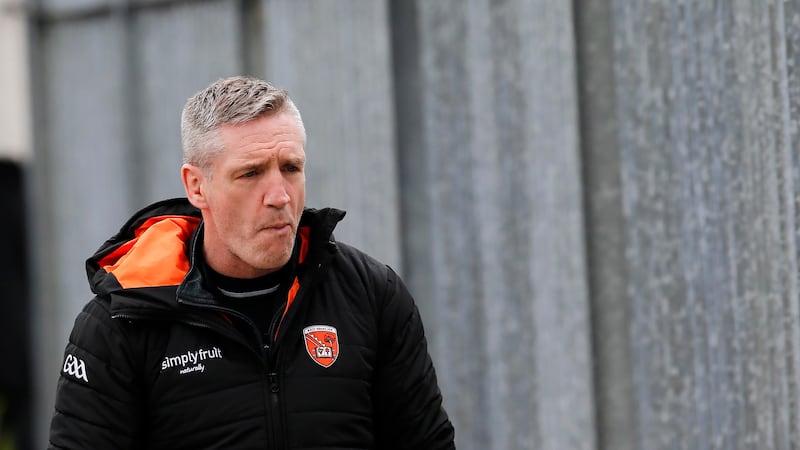There is a question about whether it’s objectively offensive to chant “ooh ah up the Ra,” a chorus of Celtic Symphony that was written for the centenary of Celtic Football club, or for that matter, Irish rebel songs in general.
The answer is no.
Despite some claiming they are singing rebel songs, they become sectarian on account of they’re being perceived that way.
A British sports presenter raised an issue with education in the Irish women’s soccer team. When it comes to Irish history, a ridiculous thing for someone in British media to say, given that nation’s epic blind spots regarding its own history. But the broader question is, why does a context exist in which they are not just still chanted, but in fact becoming more common?
Let’s not forget, and how could we, today’s Irish nation was created by the IRA and is divided. While some differences can be insignificant or almost unnoticeable, some are such with cultural and social impact on others. In fact a central principle of the justification for rebel songs is that they represent a long- standing tradition of fighting for Irish freedom.
Younger people are reclaiming and reinventing nationalist slogans and songs. Not necessarily in support for dissident IRA groups. It’s part of the nation’s psyche – nationalism as an ideology. There is a lack of respect towards a definitional Britain and their involvement in Ireland over the years. The tradition of rebel songs in Ireland date back to the period of English (and later British) crown rule, and describe historical events in Irish history such as rebellions against the crown and reinforcing solidarity among the people of Ireland. In song or verse it comes to the fore.
Having never released an overtly political song before, Paul McCartney was condemned by the British media for his song Give Ireland Back to the Irish in response to the news that British troops in 1972 in Derry killed 13 Civil Rights marchers. There have been numerous films shown worldwide and verse by notable world renowned poets depicting Ireland’s fight for freedom.
While the armed struggle has gone away, nationalism’s cultural sentiments in song or verse have not.
JAMES G BARRY
Dublin 6
Stop the brainwashing and the war
Can we stop the overt brainwashing of our people from the mass media on a one sided anti-Russian view of the conflict in Ukraine (especially when access to the Russia media is denied). It seems that the BBC and RTÉ are at the beck and call of President Zelensky who is free to make any statements without being challenged.
I believe when this terrible war ends (and hopefully soon) the final boundaries of Ukraine will be defined by the intolerance of their ultra-nationalist policies that forced confrontation with their fellow citizens whose only crime was to speak, sing and pray in their Russian mother tongue (they will lose the Russian speaking eastern and southern regions).
The Irish government has rendered itself useless in helping to stop this conflict by abandoning our neutrality and behaving like a puppet state of the warmongering western powers. These serial invaders who fresh from their defeat in Afghanistan and with no shame have helped to provoke and escalate the war in Ukraine.
It will be without doubt a colossal mistake to permit our Irish Defence Forces (IDF) to align themselves with the Ukrainian Armed Forces as part of an EU training mission when the Ukrainians have far-right paramilitaries in their ranks with their neo-Nazi ideology and because they are at war with another sovereign nation.
To speed up the end of this war maybe we could get the Minister of Foreign Affairs and Defence, Simon Coveney, to convince his Ukrainian defence counterpart to run their army the same way he manages the IDF – if implemented this senseless war would be over in two minutes flat.
We could then surely get the taoiseach, Micheál Martin, to soften the blow for President Zelensky on the potential loss of Ukrainian territory by showing him how his government pretends with straight faces to everyone that Ireland is a complete nation even when it’s missing the whole of the north-east of our country.
We should all work for a fairer and more caring world and thank those courageous journalists, reporters and editors who despite the odds fight every day to tell the truth about events which have an impact on all of our lives against the propaganda and interests of the global elite.
MICHAEL HAGAN
Dunmurry, Co Antrim
It’s a hard time to be a parent
For many in Northern Ireland it’s a hard time to be a parent. Just as the lockdown stopped and it felt like life was starting to return to normal, the cost-of-living crisis is upon us so it’s hardly surprising that many parents are feeling anxious and having a tough time, especially as winter approaches.
The NSPCC’s Helpline service was created so that adults had somewhere to turn if they were concerned about the welfare of a child but we’re also here for parents who need support and advice around child welfare issues. The Belfast base, where I work, employs around 45 staff who are made up of professionals from different backgrounds including healthcare, police, teachers, social workers and counsellors. We’re available every day and are contacted by thousands of parents about all sorts of issues. Sometimes it can be very difficult to discuss these issues and get the right support but we are happy to give advice and refer to relevant authorities if it’s appropriate.
If you are struggling with any aspect of parenthood I would encourage you to contact us. Please remember, no problem is too small and we’re here to help.
The NSPCC Helpline is free to call. You can call us at 0808 800 5000 or email help@nspcc.org.uk
JOANNE McDONNELL
NSPCC Northern Ireland
Consensus decision-making
Just as a half of a half is a quarter, so too, a majority of a majority is often a minority. Real majority rule is best effected in an all-party coalition – which is what we should have anyway, given Covid and climate change.
Accordingly, parliament should resolve its policies in multi-option, preferential ballots – in a nutshell, if there’s no consensus, it’s the status quo ante. Would consensus voting work? The first person to dismiss this ‘consensus nonsense’ was Napoléon Bonaparte who then, in three majority vote referendums... and the rest is history. Next in a party caucus majority vote was Lenin, then the binary referendums of Mussolini and Hitler and yet more bloody history.
So, all-party power-sharing – in a six-party parliament, there might be six budget proposals on the table. Debate, tweak, composite perhaps, and take a preferential ballot; parliament then adopts the policy with the highest average preference (if it passes a certain threshold), and MPs accept collective responsibility for the decisions of parliament.
Some politicians would find consensus decision-making difficult – indeed, they might well walk out.
PETER EMERSON
Director, the de Borda Institute, Belfast BT14








